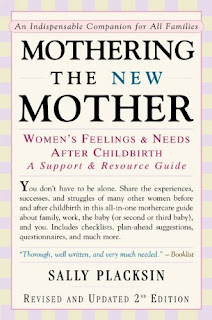While I am a birth doula "by night", I often do postpartum work during the day. Recently, a colleague suggested I read this book. Since I have not done a lot of reading on the postpartum period, I decided to see what it was all about. The very title suggests an extension of doula care. As the doula, it is my role to mother the mother. Sally Placksin suggests that this should continue well into the postpartum period for a new mother. Though American culture often overlooks this, it is very important for a new momma to continue to have a support system beyond the birthing room and into the first year of motherhood and beyond.
Placksin ellaborates on author Dana Raphael's term "matresence" and discusses that the transition into becoming a mother is much like going through adolescence-- a time of personal upheaval of sorts and rediscovering your identity. Throughout the book, many mothers recount their individualized experiences as they journeyed into motherhood, and all of the feelings and emotions that go along with the changes happening in their home and work life. Placksin covers a variety of postpartum issues, including postpartum depression and breastfeeding, as well as the different emotions that go along with either going back to work, or staying at home to care for a new child, and how motherhood changes with each additional child. The author suggests each mother assemble her own care team for after the birth. In many other cultures, a mother is very much the focus of the first year, while here we leave mothers to fend for themselves and expect that they will know the answers to mothering simply by giving birth. Placksin encourages mothers to have a list made of people to call over the phone to be able to ask questions or vent to when you are having a difficult day. Each topic section also has a resource listing of books, classes, groups, websites, and movies related to the specific ideas covered in that section, making it easier for isolated families to find connections with others dealing with similar things.
I very much appreciated the many perspectives of different mothers, often explaining that they had expected motherhood to be one way, when in fact it was completely different than they had expected. I appreciated their genuine expression of feelings of both joy and wonderment and also fear and inadequacy. Women are very judgemental of each other, and can especially be judgemental of other mother's choices. It seems important that we as women would be more willing to come alongside other women during this time, rather than be critical and offer an opinion for every milestone in their child's development. As a birth doula, it was interesting to think about the emphasis we place on the birth without thinking much at all about the postpartum period. As is often said at The Childbirth Collective parent topic nights, "You have a baby, and then you bring them home." Simple enough, but many people don't spend that much time preparing for weeks, even months of sleepless nights, stress, and changes in your relationship with your partner.
After reading this book, I have decided to spend more time with families prenatally preparing for the postpartum period, and helping them think through developing a support network to ease the transition into parenthood. I thought that this book had many valuable insights into the transition into becoming a new mother, and I think it would be a very valuable resource for any mother to read.

No comments:
Post a Comment